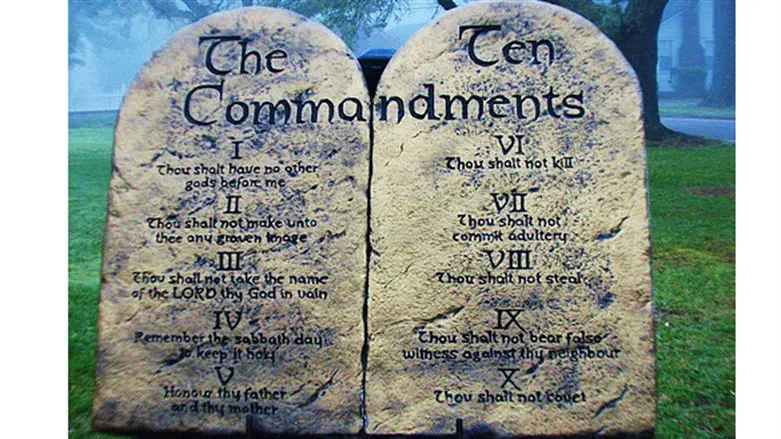
The Ramban has an intriguing commentary on these psukim:’They are not written in the order that the events occurred; they refer to the events preceding the giving of the Ten Commandments.
‘Whilst most parshanim say that these events occurred after the Ten Commandments, that is not my opinion, because the people here do not say: ‘Lest Hashem speak FURTHER with us’, but ‘Lest Hashem speak with us’, as He had not spoken to them up to this point.
‘This would clearly be incorrect if this was said after Hashem had given them the Ten Commandments, which He spoke to them.
‘The order of the events is that: On that morning, those sounds and sights occurred, whilst Bnei Israel were camped at the foot of the mountain. Moshe urged them to come closer, the sound of the Shofar growing stronger, but the frightened people THEN said to Moshe, that Hashem should not speak to them, lest they die, as would surely occur should they hear Hashem’s voice.
‘Despite Moshe’s reassurances, the people were not prepared to come closer, so Moshe came nearer to the thick cloud, and it was then that Hashem uttered the Ten Commandments’.
The Abarbanel brings the view of the Ramban, but rejects it, noting that our psukim clearly state that the people’s fear was from the thunder, flames, shofar and the smoking mountain, AND did not mention Hashem’s voice, which was what they dreaded most, as is clear from their words to Moshe: ‘Let G-d not speak to us, lest we die’.’
‘Therefore’, he concludes, ‘we must say, as the other commentators have all expounded, that these psukim are related in the order in which the events occurred; and that, after the people heard the Ten Commandments from Hashem, they said to Moshe: ‘Let Hashem not speak further to us’, fearing that it was Hashem’s intention to teach them the rest of the Mitzvot and the Torah Himself.
‘Fearing that this would be life-threatening, after the effect on them of hearing the Ten Commandments from Hashem, they pleaded with Moshe:’You speak to us and we shall hear; let G-d not speak to us lest we die’’.
The Ibn Ezra similarly comments:’Bnei Israel spoke after they had heard the Ten Commandments, out of their great dread, because they feared that Hashem would speak further with them, and they would die, which is why Moshe felt the need to reassure them:’Do not fear’’.
Haktav veHakabala brings the commentaries of both the Ramban and Abarbanel, but differs with both of them.
He asks on the Ramban: If Bnei Israel drew back from their original position, because of their fear, why did Hashem need to adjure Moshe, after he had ascended, against the people coming too close, saying:(19:31)’Descend, warn the people, lest they break through to Hashem, to see’?
He therefore offers a third interpretation:’Our psukim speak of what occurred during the giving of the Ten Commandments, after the people heard the first two Commandments from Hashem.
‘It was then that we read that (19:19):’The sound of the shofar grew continually much louder, and Moshe would speak’.
‘This is indeed the commentary of Rashi, on this passuk:’Moshe would speak’: When he said the last eight Commandments to Bnei Israel, since they only heard the first two from Hashem; and Hashem aided Moshe, by strengthening his voice, so that his voice could be heard by the people, as he spoke the final eight Commandments to them’.
‘Hearing the first two Commandments from Hashem, the people feared that ‘it was beyond their souls to suffer to hear any more directly from Hashem’.
‘This led them to plead with Moshe:(20:16)’You speak to us and we shall hear; let G-d not speak to us lest we die’’.
The Alshich Hakadosh adds:’Our Sages (Makot 24.) say that the people only heard the first two Commandments from Hashem, since the Torah states that they pleaded with Moshe:’You speak to us’.
‘Since this is written in the Torah after all the ten Commandments, how do we know that this was said by them after they heard the first two Commandments from Hashem?
‘Answer: Because we first read:’The sound of the shofar grew continually stronger’, and this, say our Sages in the Mechilta, was the voice of Hashem; and then we read:’Moshe would speak’, denoting that the people then heard Moshe, and not Hashem, speak, teaching that they first Hashem speak, but, as they could not ‘bear’ to hear any further directly from Hashem, Moshe spoke.
‘But we still do not know at what point this occurred!
‘Answer our Sages: this is alluded to in the passuk:(Zot Habracha 33:4) ’Moshe commanded us to the Torah’, the numerical value of ‘Torah’ being 611’-the remaining two, there being 613- ‘’I am the Lord..’ and ‘You shall have no other G-ds’, we heard from the mouth of the Almighty.
‘Therefore, only from the third Commandment ‘Moshe would speak’, so that the people indeed heard 611 Mitzvot, from Moshe.
‘We still need to explain why Hashem ‘insisted’ that the first two Commandments should be heard by the people, from His mouth, and not the third or fourth.
‘This is because He wanted to instill in them the foundations of our faith face-to-face, and all of the Thirteen Principles-or most of them-are to be found in the first two Commandments’, as the Rav goes on to explain.
A concluding thought from the Rashbam, in line with the view of the Ibn Ezra and the Abarbanel:’If Bnei Israel had not, after hearing the Ten Commandments from Hashem, said to Moshe:’You speak to us’, we would have heard all the Mitzvot from the mouth of Hashem!’
לרפואת נועם עליזה בת זהבה רבקה ונחום אלימלך רפאל בן זהבה רבקה, בתוך שאר חולי עמנו.